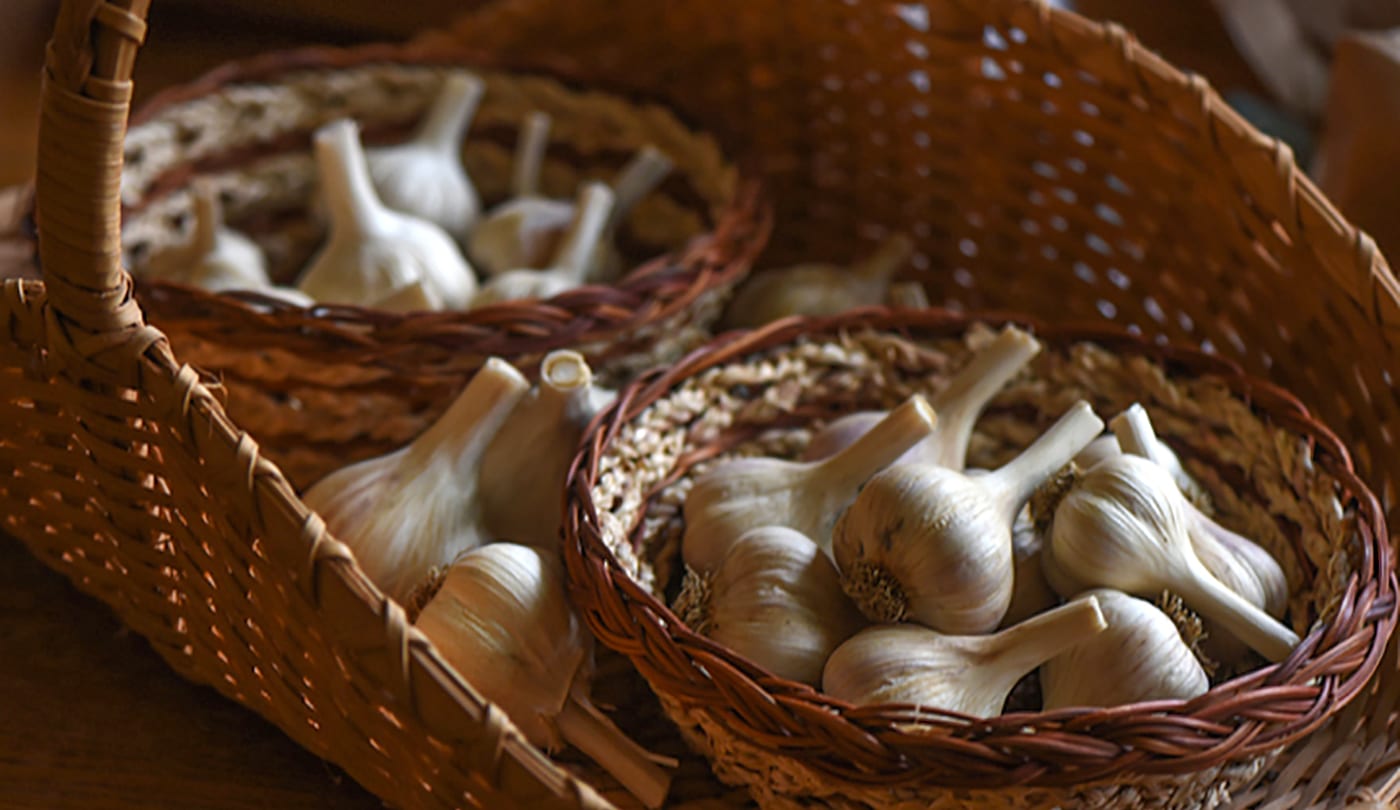
It was a struggle to grow garlic successfully when I first tried decades ago. I was sitting on a loading dock at the now-defunct Youngstown Vindicator when I learned the “right” way to plant the cloves.
A guy who worked in the layout department was the first to educate me on proper planting techniques.
What type of garlic to grow
My first task was to find the correct type of garlic to plant. The stuff in the grocery store wouldn’t work, he said. It might not be hardy and could even be sprayed with something that retards sprouting. Thankfully, finding official seed garlic is pretty easy these days. Most good nurseries and garden centers have several types available for planting.
Finding bulbs grown locally will also work. Many local farms or farmers markets sell their own bulbs. There is actually no difference between seed garlic and the varieties offered as food — as long as we know where it comes from.
Two of my favorite varieties include ‘German White’ and ‘Music.’ They produce large bulbs with big cloves. These two are great for beginners, as they produce something that looks like varieties from the grocery store — something most gardeners long for. Every season, those two cultivars are planted in my garden, but I have others like ‘Spanish Roja,’ ‘Lorz Italian,’ ‘Killarney,’ and ‘German Porcelain’ as well. Each one offers something different, whether it’s heat, flavor, size, or the number of cloves.
When to plant garlic
My co-worker on the dock was adamant that the garlic cloves, once split from the head, needed to be planted under the dark of the moon. That doesn’t mean at night. It's a moon phase that happens in 2020 on October 16. He told me that no matter how deep you plant the cloves they will all be exactly three inches deep the next July when harvested; he was right.
I know it might sound a little "out there", but many great gardens are planted with the moon phase in mind. I’ll be planting some cloves on the big day, but usually end up planting throughout October and November anyway.
How to plant garlic
The cloves must be planted in soil that is rich and well-drained. Adding a three or four-inch layer of good compost to a bed provides the perfect home for the cloves. Bulbs are separated into cloves and then planted about three inches deep and six inches apart. Planting bigger cloves usually means bigger bulbs at harvest time. I like to plant smaller, leftover cloves close together on the edges of beds. These will provide greens through mid-summer before going dormant and emerging again in the fall. They will usually hang in there until the really cold weather sets in. I’m nibbling on them as I write this column. The hot, dry summer has given them a nice bite.
Water the soil over the newly planted cloves and then mulch with a thick layer of straw or other similar material. The mulch is also critical, acting as a blanket that helps the cloves during temperature swings.
We’re hoping the garlic doesn’t sprout in the fall, but it might. If it does, just let it be. The garlic will be fine when winter arrives. When it does get cold, the mulch will help keep those underground cloves happy.
How to harvest garlic
Garlic from the garden is like anything else from the garden; simply unsurpassed in flavor and texture. One of the great things about being growing garlic is all the ways a single planting can be harvested. In the spring when the crocus bloom, greens from the cloves will begin to emerge. They can be harvested sparingly as the greens feed the bulbs below. There is a small, fat bud that emerges early from the center of the plant which is especially tasty, but it is only there for a couple of weeks.
Hardneck varieties, which are mostly what we plant in the north, will then produce a seed head called a scape. It will grow straight up, then curl around. When this happens, it must be removed so the plant uses its energy to grow big bulbs, not produce seed.
The scapes are a delicacy in the kitchen and one of the last seasonal crops left on the market. They can only be found in early summer during the harvest. I use them as the base for pesto and also roast them after coating them with good olive oil and then adding a pinch of sea salt.
When the scapes are left in the garden, there’s enough energy left in the stem to form the seed head. The little seeds are referred to as bulbils, a small clone of the bulb below. Since each bulbil — the size of a corn kernel — has its own papery sheath, they are a pain to use in the kitchen. They are much better suited for snacking in the garden. If the bulbil is planted, it should eventually make a nice sized bulb after about five years. (Not worth the time or effort in my mind, I’ve never actually seen it done either.)
The early harvest of the young plants provides a smaller bulb without the fully formed papery covering. These usually are not as potent as the mature bulb and are filled with wonderful garlic oil.
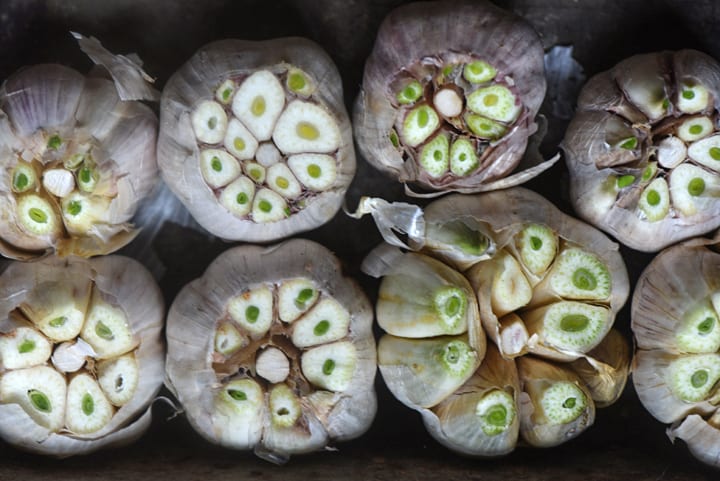
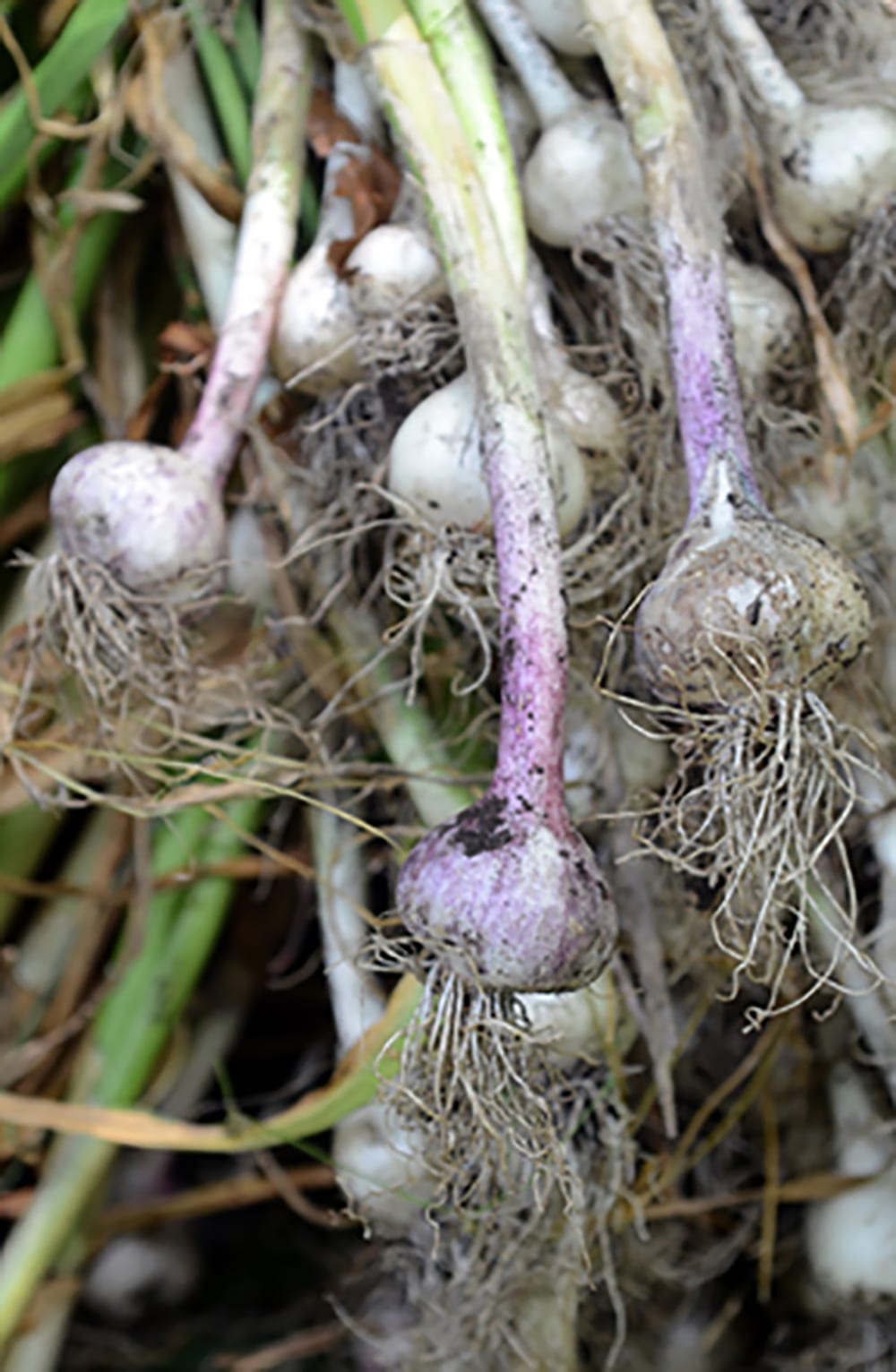
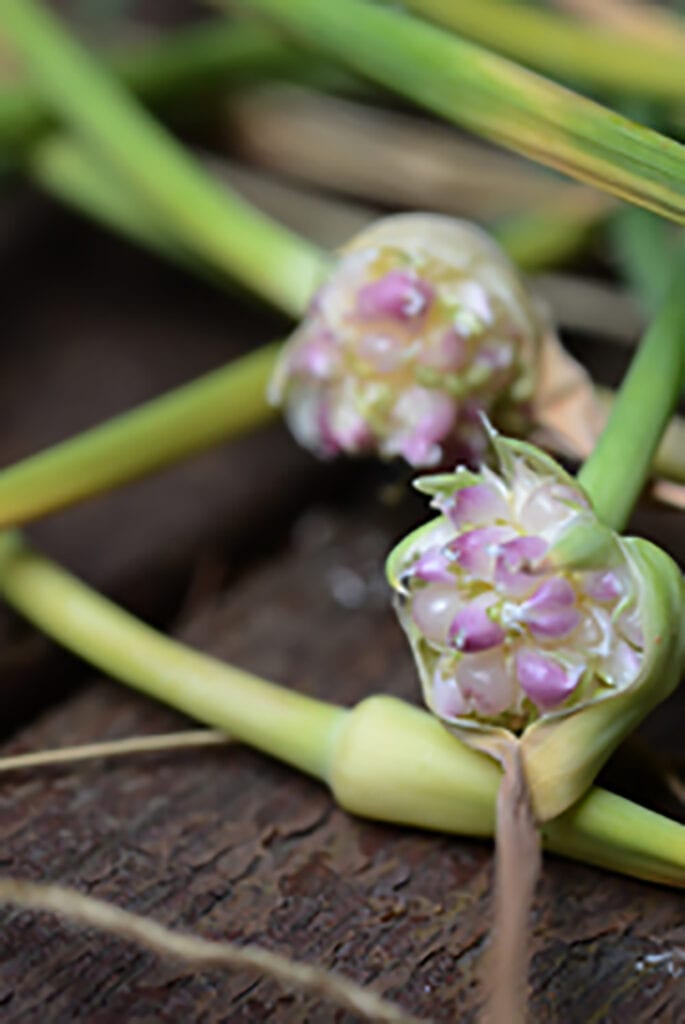
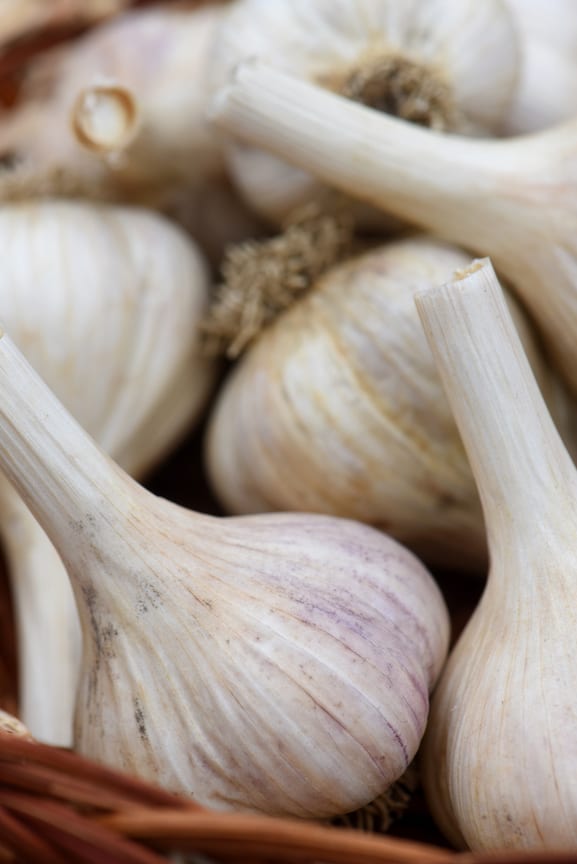
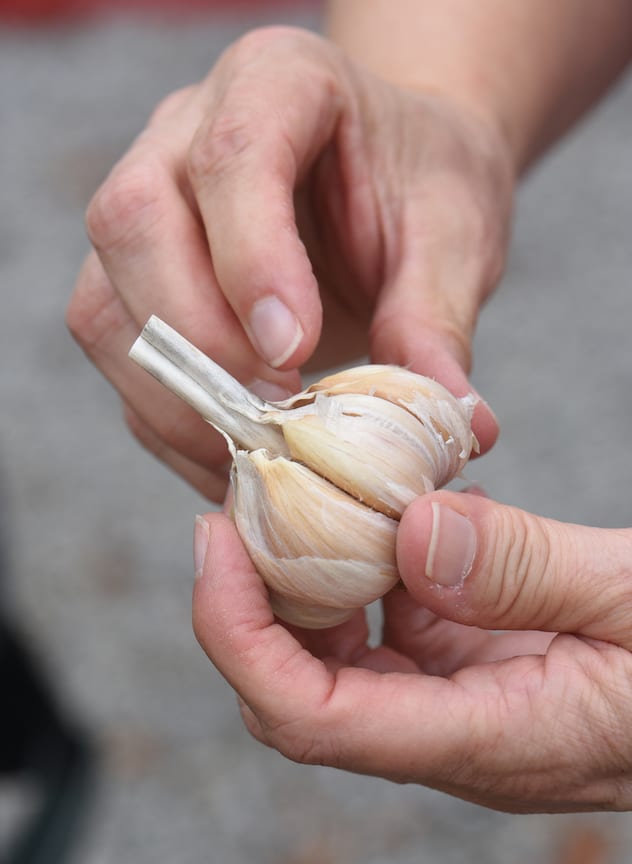
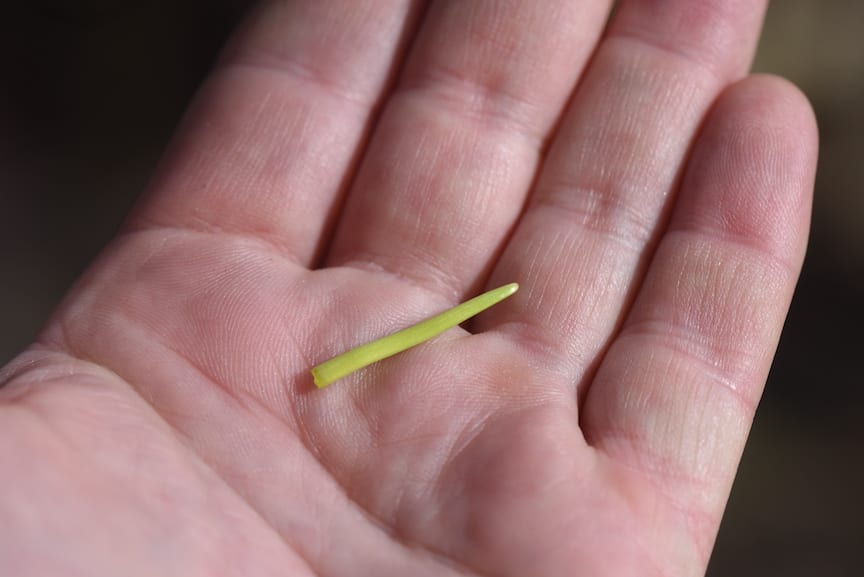
When the foliage of the plant turns about 50 percent brown, the bulbs below are ready to pull. I usually take one or two from different beds to be sure they are ready. I'll look for a tightly formed covering of the papery sheath. Better to harvest early than wait too long, especially when planning to store the garlic. Delaying the harvest causes the cloves to split and while still tasty, they will not last as long.
How to dry garlic
The bulbs should be hung in a warm, dry place to cure for three weeks. Leaving the stalks on is another trick to make them last.
Store them in an onion bag or open basket. Never seal them in plastic as they will sprout and spoil soon.
A final word on garlic's greatness
One word about the fragrance of garlic after a meal. Once your body gets used to eating lots of fresh garlic, it will adjust. But you’ll know when you’ve had too much, as will all your friends.
Growing garlic is easy, but uses the area from late fall through mid-summer. Bush beans are a great succession crop after the garlic is done.
During the winter, cloves can be planted on the windowsill which will produce fresh greens. They are a great addition to any recipe and are great to eat raw, too.
In the immortal words of my friend Pittsburgh artist Johno Prascak, “it would be a sad world without garlic.”
I couldn’t agree more.

Great article
Thanks so much!
I just finished planting 100 ft. of both German White (Janoski’s) and Mucic, another row of both Chesnok Red and Bogatyr going in today.
That’s a busy day!
Hi Bill, those are some great varieties. I’m still planting.
Awesome ?
[…] How to grow garlic by planting in the fall. […]
Want to grow Elephant Garlic.
Check out http://www.ElephantGarlicWorld.com. They are located in Oregon and have been growing and selling Elephant garlic for use as seed stock and for eating since 1999.
Non GMO and Pesticide Free. Plus they use no chemical fertilizers. Check out the web site. Lots of info and nice pictures of the farm.